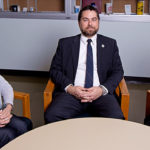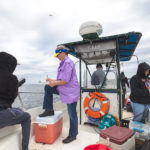Students, Faculty Discuss Evaluating Parks in Mid-Size Towns
New Orleans – University of West Florida faculty and students who collaborated on a comprehensive project that surveyed the quality of Pensacola’s parks made presentations at the annual meeting of the American Society of Criminology held Nov. 16-19 in New Orleans.

Presenting at the conference were Dr. Jocelyn Evans, associate dean for the College of Arts, Social Sciences and Humanities, Dr. Sara Evans and Dr. Jamie Snyder, both assistant professors in the Department of Criminology and Criminal Justice, and Dr. Derek Morgan, an assistant professor in the Department of Earth and Environmental Sciences. UWF students Janise Best, Lena Breau, Austin Vanvalkenburg, Rachael Greller and Anthony Noll, who is in the Kugelman Honors Program, also presented at the conference.
Earlier this year, 10 teams of three students canvassed local parks and evaluated the spaces in terms of inclusiveness, meaningful activities, comfort, safety and pleasurability by using the Public Space Index designed by urban planner Dr. Vikas Mehta. Mehta, formerly of the University of South Florida, is now an associate professor of urbanism at the University of Cincinnati.
Meanwhile, another 10 teams of three students surveyed 195 users over a two-week period at five major parks (Community Maritime Park, Bayview, Roger Scott, Legion Field and Sanders Beach) about how safe they felt at each of those locations.
The UWF faculty and students presented on two full panel sessions during the conference in New Orleans, about their work on the parks project.
“The first one was on teaching and learning, and it involved four separate presentations,” said Evans, on behalf of the interdisciplinary team of faculty supervising the parks project. “Dr. Jamie Snyder gave an overview of high impact practice in education. The particular high impact practice used in this course involved undergraduate research. The students gave the additional presentations, focusing on the project as a learning experience and mentorship as a tool for retention and academic success.”
Faculty spearheaded the second panel presentation by the UWF group. The panel included discussion of using multiple scientific methods to examine and visualize park users’ fear of crime, perceived risk of victimization, and sense of collective efficacy. Additionally, presenters reported observational data on the quality of city parks in Pensacola.
Evans said her presentation focused on the use of the Public Safety Index – the observational data. Evans noted that this measure was developed for more urban environments, such as Chicago, Detroit and New York City.
During the panel, the data and findings from observation of Pensacola parks sparked a discussion about how the index as a tool could be altered to better represent the conditions at and quality of public spaces in smaller cities such as Pensacola, Evans said.
“We were able to engage in a broader dialogue of the extent to which we need to re-evaluate our measures for less urban environments,” Evans said. “Could we develop a scale that was much more applicable for mid-sized cities nationwide?
Evans said members in the audience asked questions to the UWF faculty and students about how they were able to pull off the logistics and manage the magnitude of the parks project. UWF faculty members noted that participating in research projects such as this one is important for both the retention and professional development of students. They then polled the UWF students participating on the panel, asking how many were either currently attending or planned to attend graduate school. All of them raised their hands, Evans said.
“I think that what was most impressive to the people in the audience was that while it’s a really big investment of time and resources, it can make such a difference in these students’ academic experience,” Evans said.



